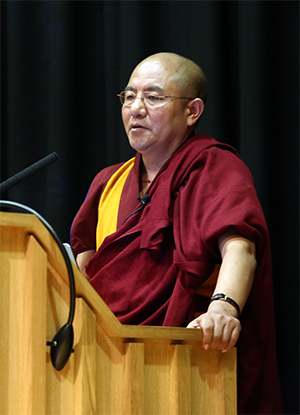Reflections on a Life of Teaching and Translating Tibetan Buddhism Across Cultures
Khenpo Sodargye shares his personal experiences, his different objectives during social changes, how he became a monk, and what motivates him in the work of translating dharma teachings. He also discusses his biggest concern about the Tibetan culture and how to deal with the conflict between traditions and modernization.
My Impetus for the Translation of Buddhist Scriptures
The Priorities in My Life
Except for the translation of Buddhist scriptures and the transmission of Buddhadharma, there is no other main work in my life. I think translation is very important. If we can preserve the translated works well, they will become the most valuable heritage of the nation.
My Impetus for the Translation of Buddhist Scriptures
Why do I have such a strong impetus to translate Buddhist scriptures? There was once a great Tibetan sage named Gendun Chophel. He mentioned in one of his works that thanks to all the previous Tibetan kings and great translators, we could study, without leaving our meditation cushion, all the Exoteric and Esoteric teachings of the Buddha—approximately one hundred and four volumes in total. These words seem to be very mundane, but I was greatly inspired by them when I just started to translate Buddhist scriptures.
The Importance of Translating Buddhist Teachings into Different Languages
Buddhism plays a very important role in eliminating people’s sufferings. In particular, Tibetan Buddhism can withstand the closest scrutiny. In any case, it can’t be refuted by scientific analysis. This is an undeniable fact rather than my empty words. Moreover, if people can practice the Buddha’s teachings in their heart, they can truly relieve themselves of physical pains and mental sufferings. I am just a nobody. Maybe, I think too much. But, if we can translate Buddhist scriptures into different languages, then it will bring great benefit to many people. As Chinese is a major language connected with many nationalities, we chose to translate the scriptures into Chinese first. Later, we will also have English translations. Thus, a wider range of people may be benefited.
Be Concerned About Cultural Heritage
We should also be concerned about the languages and cultural heritage of other nationalities in the world and strive to protect them. As intellectuals, we should pay close attention to this. Many scholars claim that the moment the language and culture of a nationality disappear, in that same instant, the inevitable complete extinction of the nationality has begun. This is despite the fact that these nations may once possess rich cultural heritages and well-established traditions, they would no longer count in the international arena of cultures.
The Harmonious Coexistence Between Traditional Cultures and Modern Science
I think it will be very distressing if traditional cultures and modern science can’t coexist harmoniously in the future—the rise of one leading to the fall of the other. True enough, while the development of modern science and technologies have reached an unprecedented height, there is also an unparalleled decline of individual happiness quotient—people have never experienced so much anguish. This is the resultant effect caused by the imbalance between traditional cultures and modern science.

The Priorities in My Life
Except for the translation of Buddhist scriptures and the transmission of Buddhadharma, there is no other main work in my life. I think translation is very important. If we can preserve the translated works well, they will become the most valuable heritage of the nation.

Be Concerned About Cultural Heritages
We should also be concerned about the languages and cultural heritage of other nationalities in the world and strive to protect them. As intellectuals, we should pay close attention to this. Many scholars claim that the moment the language and culture of a nationality disappear, in that same instant, the inevitable complete extinction of the nationality has begun.
“Cultures vary from country to country. Through translated works, people can have a good general knowledge of other nations’ advanced thoughts. It is the same with religions. Communication through translated works is the most important way to help people cross the boundaries of nationalities and countries so that they could delve deeply into a religion and understand its teachings.”
















